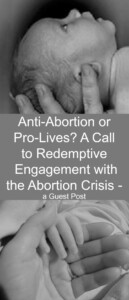Anti-Abortion or Pro-Lives? A Call to Redemptive Engagement with the Abortion Crisis – a Guest Post
More than one way to be pro-life.
The recent passing of the Reproductive Health Act by the New York State Legislature has served as a chilling wake up call to many Christians. The passing of this Act removed a long-standing ban on abortion after twenty-four weeks, effectively making it possible for a full-term abortion of any child if sanctioned by a healthcare professional. New York joined eight other states that provide no legal protection for infants inside the womb. However, the public reaction and emotion surrounding this bill have seemed to be stronger than when previous states enacted similar laws. The political climate may be partly to blame for this response, but two other factors contributed to this as well. One, the Act was signed into law by a governor who is affiliated with the Catholic Church. Two, the passing of the bill was celebrated by lighting up famous sites in NYC with pink.
My heart is heavy. I have wept over this tragic decision here in my state. I ache deeply over the evils of abortion and the millions of human lives this horror has claimed. I hurt for the thousands of women who are merely seen and used as pawns for political power on all sides of the issue. I grieve for how little value we, as a nation, are putting on human lives. And, quite frankly, I am troubled by the responses of many conservative Christians to this issue. In writing this article, my desire is to confront some common misconceptions and counter-productive attitudes surrounding the abortion issue while casting a vision for a more redemptive response.
Pro-life is More than Being Anti-abortion
As Christians, we believe that humans are the pinnacle of God’s creation, made in His own image. This is a dignity that we must value, defend, and promote for all humans, born or unborn. All humans are created for purpose, for relationship with Jesus, to be known and loved by God. We must be pro-life!
Too often, followers of Jesus equate pro-life with only being anti-abortion. I too was guilty of this. It was while volunteering at a holistic pregnancy crisis center as an older teenager that my eyes were opened to the complexities surrounding the abortion issue. As I heard women’s stories, saw their pain, and prayed with them, I came to understand that I had to embrace much more than an anti-abortion stance before I could claim to be pro-life. I realized the Christian’s duty surrounding this issue is not cookie-cutter clean; it necessarily is messy because it is inherently broken. Pro-life means being pro-baby, pro-mom, and pro-dad. It means holding up a standard of morality while being willing to wade into the messiness, joining Jesus in His pursuit of cosmic redemption. Prettily packaged answers of abstinence, adoption, and the need for new laws are not enough. There is a place for Band-Aids (thank God they exist), but our primary focus should be on limiting the wounds.
Confronting Common Misconceptions and Poor Responses
We often need to clean up our own core assumptions and reshape our own mindsets before we can begin to engage in healthy, redemptive ways with contemporary issues. The abortion crisis is no exception. Here are some troubling mindsets and responses that I (and others who gave input for this article) have heard or noticed among conservative Christian circles.
#1. The Baby is Unwanted / The Mother is Selfish
While this may occasionally be true for abortion cases, it is often not the case. Many women who feel like they must choose abortion come from horrible situations. As a mother, I would shudder to have my child grow up in the generational clutches of brokenness and evil that many women are caught in. These women often feel the same way. They have no desire for their child experience the horrors with which they live. Many are caught without finances, resources, and limited opportunities and they see no way out. There is often incredible shame alongside pregnancy and these mothers have no desire for their child to have to carry the shame of how it was conceived and the situation it was born into. When this is all you know and the only “hope” you have for your child, it doesn’t take much to convince yourself, or to be convinced that abortion is the loving option.
Friends, please be careful of assuming or using language that implies that an aborted baby is an unwanted baby. This mindset and these accusations only serve to create a culture of judgment and shame that will drive women away when they most need our love and support.
#2. The Mother Needs to Get Her Life Together and Stop Sleeping Around with Men
As was mentioned above, many women who choose abortion are living in hopeless situations without anybody in their life to give them love and support. Many times sex is the only path for them to feel at all wanted or loved. Or, sex may be “forced” on them as a way of staying in a relation-ship and having housing and a place to belong. Carrying a baby full-term often means losing a job, embracing shame, losing a boyfriend/husband, and possibly homelessness.
It is much easier for us to judge and give advice than to engage in the mess with love and support. If we want to save children, though, we must be willing to love and support mothers. I cringed recently when I heard the testimony of a mother who chose an abortion after being shamed by her pastor but felt loved and understood by the people at the abortion center. This was the reason she was willing to choose their advice. Unfor-tunately, this is not an isolated scenario.
#3. Adoption is the Abortion Alternative
Please, don’t get me wrong! I am all for adoption. I have close friends and relatives who have adopted. I wish more people would choose to adopt. I think adoption is heroic.
But…adoption is not the cure-all, or even the best solution for the abortion crisis. As mentioned above, a woman who chooses to carry her child full-term and adopt is still often likely to lose her job, face rejection, and stay caught in the same terrible lifestyle. So often the cry of “just give me the baby” is coming from an attitude that forgets or disdains the mother and the father of the child. Adoption is beautiful and good but it is a reflection of brokenness. It is only an option because of sin in this world. While it may be a beautiful answer with beautiful stories, I fear that sometimes we see adoption as the only alternative to offer because it is the cleaner alternative to the messiness of caring and supporting the mother, the father, and the child. Adoption is a Band-Aid and I’m grateful for it. But friends, please don’t promote it as the primary alternative/cure or use it as a way of helping from a sanitary distance.
Pursuing Redemptive Responses
So, what is the cure? Ultimately, the cure is for Jesus to return, fully eradicate evil, and bring to completion His desire for a pure, redeemed world. Until then, the whole cosmos continues to groan in brokenness, longing for redemption (See Romans 8). Jesus does not stand at a distance simply observing this groan until the time of consummation; He is active! Our Savior went into the heart of brokenness, getting bloodied and enduring the worst torment imaginable in order to provide a path of redemption. He emerged victorious and stands as a gigantic figure of hope for a broken, sinful world. But He still wears a bloody robe and is on a redemptive campaign (Revelation 19). He calls us to join Him, the bloodied King, on this redemptive quest into the middle of this groaning, cosmic mess.
Can we as people of Jesus be His light, His hope, His hands and feet in practical ways? Messy ways? Painful ways? Jesus-like ways? There are so many practical methods to engage with and support redemptive ministry.
Here are some suggestions.

Engage In Redemptive Relationships
If we are going to help change the narrative of abortion, we must begin with local relationships. Advocating for new laws, sharing opinions on social media, and writing blog posts (like this one) have their place, but these are not the primary way to make a difference.
The narrative really begins to change:
- When a mother in crisis is loved, supported, and shown a new path. When she finds a real friend that she can rely on and gives her hope.
- When fathers and men in broken situations are pursued and befriended. When we help them learn the value of love and, through loving them, they learn how to love their wives/girlfriends, and their children.
- When we engage with broken families, inviting them into our homes and adopting them into our families, providing new circles of friends.
- When we learn to listen to an individual before we judge their situation or motives.
- When we adopt children and do foster care, changing the narrative for the next generation. When we are willing to pursue the messy situations like adoption or foster care of babies with medical conditions, helping to show the medical world and the parents that there is a way to love and care for these children.
- When we stop shaming unplanned pregnancies, inside and outside our churches, and instead celebrate the gift of life. Yes, sin must be addressed, but nobody involved should have to carry that burden of shame. God is a God of redemption.
We, the people of Jesus, should be able to show much better love than the worker at an abortion center. People in crisis go to and trust people who understand and love them. The onus to put abortion centers out of business does not have to rest on politicians; it is our task! Let’s be willing to get messy, risk pain, and follow our redemptive Lord into redemptive relationships.
Provide Redemptive Opportunities
Alongside redemptive relationships should be a pursuit of providing redemptive opportunities, giving a tangible path to a new life.
Here are some ideas:
- Provide good job opportunities for single mothers and low-income families. We have many incredible, untapped opportunities in our businesses to change the abortion narrative. Be willing to embrace the mess and risk of hiring ladies in crisis and fathers of unplanned pregnancies. Too often we have embraced the lie that they just need to pull themselves up by their own bootstraps, not recognizing the incredible ways that they are limited through lack of connections and opportunities.
- Provide safe houses for women in crisis with opportunities for education and learning new skills. There are some incredible ministries that are doing this and we could learn from them.
- Provide care centers for women that offer holistic, free, and judgment-free care as an alternative to abortion clinics that often offer other free services for women.
- Provide childcare for single mothers so that they can hold jobs and not be faced with homelessness or forced into abusive situations to provide food and shelter for them and their children.
- Provide inner-city schools and after school programs to help change the story for the next generation.
Support Redemptive Ministries
I am so encouraged by the hundreds of individuals and ministries who are involved in holistic, redemptive causes. These are grueling, messy pursuits and these people need our support, both physically and emotionally.
- Support your local PCC (Pregnancy Crisis Center). Be willing to volunteer and get involved in caring for women in crisis. Many times these centers are struggling for financial means to stay afloat and need our financial assistance.
- Support families in foster care and those who are adopting. These are draining ministries both financially and emotionally.
- Support the families who receive a grave medical diagnosis for their unborn child. Families facing this are often given the option of abortion by medical professionals as way to spare their child from suffering. These people need our support and help to face the life-altering changes that often comes with these diagnoses. I asked a friend with a medically fragile child for suggestions on how people can help in these situations. Here are some of her ideas:
- Money Gifts
- Simple encouragement
- People to help with household chores during long hospital stays
- Inviting them to birthdays, after church meals, and special events. Even if they can’t make it due to medical reasons it means the world to be remembered.
- Having one or two people to learn the special needs of the child and provide babysitting for date nights, assistance with doctor appointments, etc…
- Give people involved in abortion ministry or women’s ministry a platform to share about their work and opportunities to educate others for this ministry. Spend time with them in their work, learning from them.
- Support inner-city schools and children’s ministries.
- Support organizations that are involved in holistically confronting the abortion crisis and caring for women or families in crisis. Here is a list of some organizations doing this well:
- The Archibald Project
- Save the Storks
- The Esther House
- The Morning Center
- Show Hope (providing adoption aid, post adoption support, and care centers)
Friends, the abortion crisis should be a call-to-action for us. This call-to-action is much more than simply taking an anti-abortion stance or raising our voices in protest from a distance; it means being pro-life for all. What our country really needs is a massive human wave of Jesus followers going straight into the mess of broken relationships and evil that has caused this abortion crisis. We follow a Savior who offers redemption and hope to the broken and the evil. Let’s wade in with Him. There is hope!

Charis Kauffman, along with her husband Kenneth and and their 2-year-old daughter, lives in Brooklyn, NY. As a family they are discovering that their passions are bigger than their energy. If the Kauffman family is not at home when you stop by for a visit, you can likely find them in one of the many coffee shops throughout NYC, sipping on a mug of craft coffee.
This post appeared in Anabaptist Perspectives and is shared with permission of both the author and Anabaptist Perspectives. For more information about Anabaptist Perspectives, click here.







Hi Gert, While this whole issues grieves my heart as well I have to disagree with you on several issues. Here is a quote I recently read: According to the pro-abortion rights Alan Guttmacher Institute 92% of all abortions occur for “social reasons” (that is to say that the child is unwanted or inconvenient) rather than medical reasons or sexual assault as the primary basis for their abortions (1). In fact, less than 1% each of women mentioned rape or incest as a factor in their abortions at all (2) (3).
I think this makes it quite clear that although many emotions are involved the bottom line IS the child is unwanted.
I pray for this nation and the fact that we have lost all moral compass. I certainly do not want this to be in any way taken as being disrespectful to you but I do think it necessary to be very clear about the issue. Again, I weep and pray for the lives lost.
Hi Karen,
This article is a guest post. While I shared it, your disagreement is not with what I wrote. The author shares several concerning mindsets she has seen/heard among conservative Christians that stop short of doing anything to help. The point the author is making is that you cannot be pro-life if you are merely anti-abortion. To be pro-life, you have to be willing to invest time and resources into supporting mothers, fathers, and the infants – not merely condemning abortion or a life-style. You have to be willing to get messy. It’s easy to dismiss a need when we have the type of mindsets that she described. It’s a lot easier to dismiss it than to get messy. When a woman chooses abortion because she doesn’t want to raise a child in her setting or bring it into a world where it will experience what she did as a child, we can debate on whether the baby or the situation is unwanted. I think this is what the author is saying. It is not a particular baby that is not wanted – it is the situation she faces. I had a friend who chose abortion because she did not want to raise her child without a father. She grew up in a home with an absent father and she said she could not do that to her child. Did she not want the child or not want to raise one without a father? It might seem like splitting hairs – but that is what I think the author is saying. Our mindsets will affect how we minister to those who need Jesus. This is the caution, I feel, the author was giving.